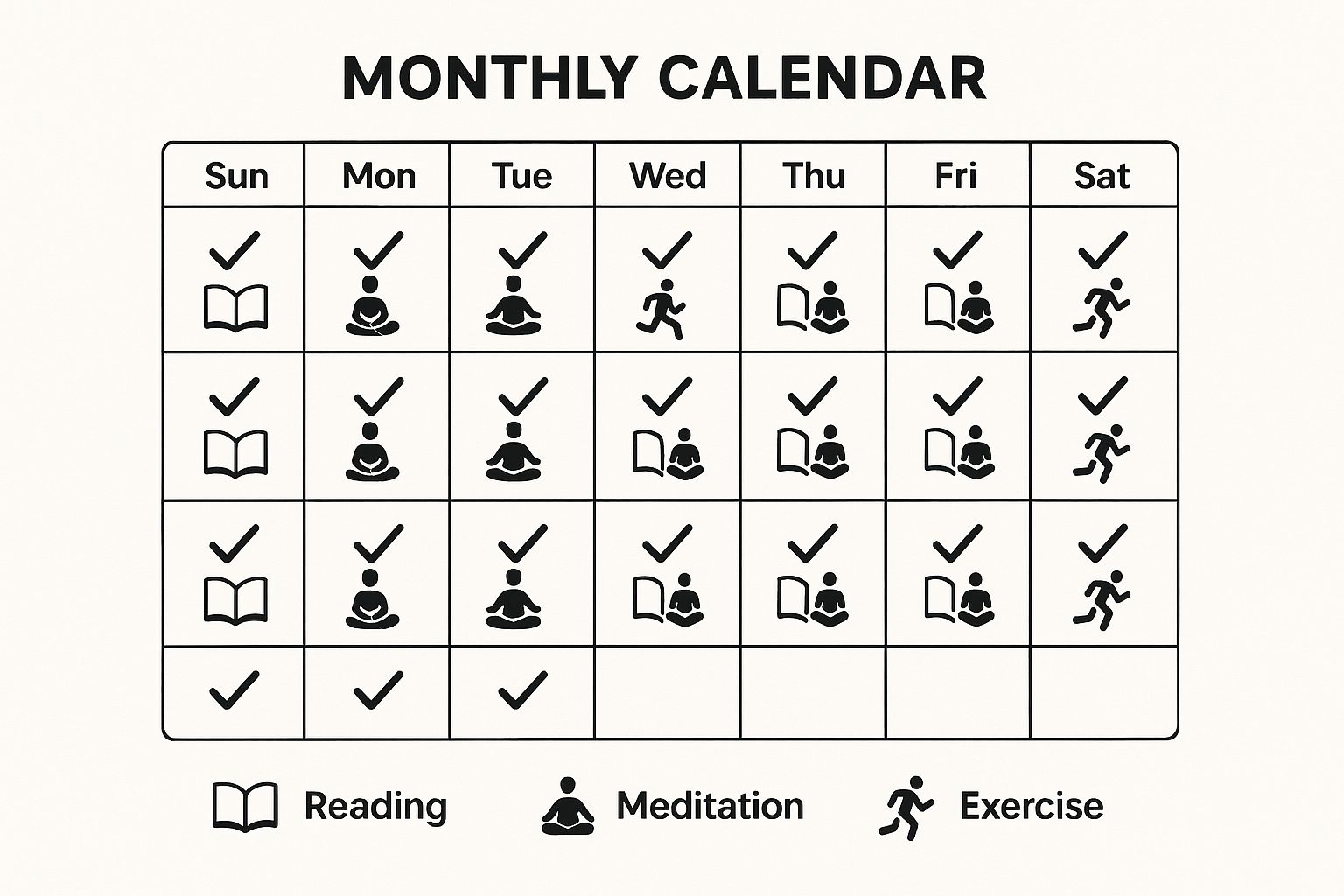Defining True Purpose: Beyond Happiness and Success

Many people mistakenly believe a purposeful life is all about happiness or success. While these can be wonderful outcomes of living with purpose, they aren't the core of it. Focusing solely on chasing happiness or outward signs of success might actually take you further away from finding true purpose. So, what does purpose really mean?
Understanding the Essence of Purpose
Purpose is like an inner compass, guiding our choices and actions. It's the fundamental "why" that motivates us, giving meaning and direction to our lives. Think of two people who achieve the same level of career success. One is driven by a desire for status and wealth, the other by a passion to use their skills to create positive change. Both might feel happy about their achievements, but the second person is more likely to experience deep, lasting fulfillment from their sense of purpose.
Purpose isn’t a fixed endpoint; it's an ongoing journey. It’s about consistently aligning what you do with your values and aiming to contribute to something bigger than yourself. This might be your family, your community, or even the world.
Debunking Myths About Purpose
There are misconceptions that can make understanding how to live purposefully more difficult. One myth is that purpose has to be grand or world-altering. But purpose can be found in the everyday moments, in simple acts of kindness and helping others. Another myth is that finding your purpose is a one-time event. In reality, it evolves and deepens over time as we grow and learn. Finally, some believe purpose is the same thing as passion. While passion can certainly energize our purpose, it isn't a requirement. Purpose can also come from a strong sense of responsibility, commitment, or the desire to overcome a challenge.
Identifying the Core Components of Purpose
While purpose is unique to each person, research shows several universal elements. These include:
- Connection: Feeling a sense of belonging and having strong relationships with others.
- Contribution: Making a positive difference in the world, no matter how small.
- Growth: Continuously learning, changing, and striving to be your best self.
- Meaning: Finding something that gives your life significance and value.
By understanding these core components, we can start to cultivate a stronger sense of purpose in our own lives. This understanding creates a foundation for exploring practical steps to build a life filled with meaning and intention.
Cultivating Mindfulness as Your Purpose Foundation

The constant noise and demands of modern life can make discovering your purpose feel overwhelming. It's like searching for a quiet melody amidst a cacophony of sound. This is where mindfulness becomes essential. It acts as a filter, helping us quiet the external distractions and tune into our own inner wisdom. But how do we cultivate this present-moment awareness in a way that truly supports a purposeful life?
Establishing a Sustainable Mindfulness Routine
Many of us have tried those picture-perfect morning routines, only to abandon them within days. The key to success isn’t perfection; it's creating a practice that works for you. This might mean starting with just five minutes of meditation each day, gradually increasing the duration as you feel comfortable.
Perhaps your mindfulness journey begins with incorporating mindful moments throughout your day. Savor the sensations of your morning coffee. Take a conscious breath before responding to an email. Find small opportunities to connect with the present moment.
This isn't about adding another task to your to-do list. It's about weaving mindfulness into the fabric of your existing routine. This approach helps you build a sustainable practice that fosters a deeper connection with yourself. By consistently showing up for yourself, even in small ways, you create space for self-discovery and begin to uncover what truly matters.
Discovering Your Values Through Mindfulness
Living a purposeful life often involves embracing mindfulness and prioritizing meaningful connections. Consider the power of single-tasking. By focusing on one task at a time, you reduce stress and increase productivity, fostering a sense of calm and accomplishment.
Dr. Lisa Damour and Reena explore these strategies in their podcast, emphasizing the importance of guilt-free leisure and nurturing relationships for a balanced life. Learn more about intentional living here.
Mindfulness empowers you to identify your core values – those guiding principles that shape your choices and actions. Through regular practice, you begin to notice what energizes you and what drains you. This heightened self-awareness allows you to make choices aligned with your values, fostering a sense of integrity and authenticity.
Instead of reacting automatically to external pressures, you respond consciously from a place of inner knowing. This shift allows your purpose to emerge organically from within.
Formal and Informal Mindfulness Practices
There are countless ways to cultivate mindfulness. Formal practices like meditation provide dedicated time for focused attention and self-reflection. This could involve guided meditations, focusing on your breath, or simply observing your thoughts and feelings without judgment.
Informal practices are equally important. These are the moments of mindfulness you integrate into your daily activities. Paying attention to the taste of your food, listening deeply during conversations, or appreciating the beauty of nature during a walk – these seemingly small acts cultivate presence and awareness.
By incorporating both formal and informal practices, you build a strong foundation of awareness that permeates your entire life. This consistent practice creates the space for your purpose to unfold naturally, revealing itself in the choices you make, the relationships you nurture, and the impact you have on the world.
Forging Connections That Amplify Your Purpose

Human connection is a powerful source of purpose. It’s the invisible thread that binds us together, weaving our individual stories into a shared tapestry of meaning. This data chart beautifully illustrates the interconnectedness of purpose and strong relationships. It reveals a strong positive correlation, suggesting that the more connected we are, the more purposeful we feel.
This section explores how cultivating authentic relationships can dramatically amplify your journey toward a life filled with purpose. This isn’t about simply collecting contacts; it’s about intentionally building bonds that nurture your growth and contribute to a profound sense of belonging.
Assessing Your Current Connections
The first step toward building truly purposeful connections is to take an honest look at your current relationships. Ask yourself some key questions: Do these relationships energize you or leave you feeling drained? Do they support your aspirations or hold you back?
Identifying relationship patterns that may be hindering your growth is crucial. This might involve recognizing tendencies to people-please, avoid conflict, or settle for superficial interactions. This honest assessment lays the groundwork for intentional change and sets the stage for deeper, more fulfilling connections.
The Power of Vulnerability
Deepening meaningful bonds requires vulnerability. It takes courage to share your authentic self with others, including your fears, hopes, and imperfections. While this might feel risky, it’s through vulnerability that true connection blossoms.
Think of vulnerability as a bridge that spans the gap between our individual experiences. It allows others to truly see and understand us, fostering empathy, trust, and mutual support. This creates space for genuine emotional intimacy and cultivates a more supportive social ecosystem where you can thrive.
Expanding Your Social Circle With Intention
Expanding your social circle is not about adding more names to your contact list. It’s about intentionally connecting with people who share your values, inspire you, and challenge you to grow. This requires being proactive and seeking out communities and groups that resonate with your purpose.
Joining a volunteer organization, attending workshops related to your interests, or engaging in online forums like Reddit centered around your passions can create valuable opportunities for meaningful connection. This intentional approach broadens your horizons, exposes you to diverse perspectives, and ultimately enriches your journey of purpose. It’s about finding your tribe and surrounding yourself with people who lift you higher.
To illustrate further how different cultures approach purpose and happiness, the following table provides a concise overview.
Let's explore how different cultures approach purpose and happiness. The following table provides a concise overview.
| Culture/Region | Primary Source of Purpose | Social Factors | Key Practices | Notable Outcomes |
|---|---|---|---|---|
| Japan (Ikigai) | Finding intersection of passion, mission, vocation, and profession | Strong community ties, emphasis on respect and harmony | Self-reflection, continuous learning, mindful living | Longevity, strong sense of belonging, low stress |
| Scandinavia (Hygge) | Creating cozy and comfortable environments, fostering connection | Emphasis on social equality, trust, and welfare | Simple living, appreciating small moments, spending time in nature | High levels of happiness and life satisfaction, strong social support systems |
| India (Dharma) | Fulfilling one's duty and purpose in life, contributing to the greater good | Family and community-oriented, emphasis on spiritual growth | Yoga, meditation, selfless service | Inner peace, strong sense of community, resilience |
This table reveals diverse approaches to purpose and happiness, each shaped by unique cultural values and practices. From the Japanese concept of Ikigai to the Scandinavian embrace of Hygge and the Indian focus on Dharma, these traditions offer valuable insights into how we can cultivate more meaningful lives.
Strengthening Existing Relationships and Navigating Difficult Conversations
Nurturing existing relationships requires consistent effort and intentionality. This might involve scheduling regular quality time with loved ones, practicing active listening during conversations, or expressing appreciation for their presence in your life. Small gestures of kindness and consistent communication go a long way in strengthening the bonds that matter most.
Navigating difficult conversations with honesty and empathy can transform superficial interactions into deeper, more meaningful connections. These courageous conversations, though sometimes challenging, often become catalysts for profound growth and strengthen the foundations of trust and understanding within your relationships.
Community Engagement and The Ripple Effect of Purpose
Engaging with your community creates a sense of belonging that extends your purpose beyond individual achievements. This might involve volunteering your time, contributing to local initiatives, or simply offering support to your neighbors. When we look beyond ourselves and contribute to something larger, we experience a profound shift in perspective.
The following bar chart illustrates how different levels of community engagement correlate with reported levels of purpose in life.
Community Engagement and Sense of Purpose
| Level of Engagement | Percentage Reporting High Sense of Purpose |
|---|---|
| Low | 25% |
| Medium | 50% |
| High | 75% |
This chart demonstrates a powerful connection between community involvement and a heightened sense of purpose. The more actively individuals participate in their communities, the more likely they are to report experiencing a strong sense of purpose. This highlights the importance of looking beyond ourselves and contributing to something larger than our individual pursuits. This outward focus creates a ripple effect, amplifying our own sense of purpose while positively impacting the lives of others.
Aligning Your Work With Your Core Values
For many of us, work takes up a significant chunk of our lives. If we're striving to live with intention, our professional lives must be a reflection of our values. This isn't always straightforward, so let's explore how to bridge the gap between our values and our careers, wherever we are in our journey.
Identifying Your Core Values
Before aligning your work with your values, you need to pinpoint what those values actually are. This takes some honest introspection. Consider what truly resonates with you. Is it creativity, helping others, intellectual stimulation, or maybe financial security?
-
Reflect on past experiences: Think back to times you felt truly alive and engaged. What values were at play in those moments?
-
Consider your role models: Who inspires you, and what values do they represent?
-
Imagine your ideal future: What kind of impact do you hope to make on the world?
Assessing Your Current Work
Once you have a clearer understanding of your core values, evaluate how well your current work embodies them. This requires an honest, and sometimes challenging, self-assessment.
-
Create a table: List your top five values and rate how well your current work aligns with each, on a scale of 1 to 5 (1 being not at all, 5 being completely).
-
Consider your daily activities: Do your tasks energize you or leave you feeling depleted? Do they resonate with your sense of purpose?
Transitioning Towards Purposeful Work
If your work isn't in sync with your values, think about how to make a shift. This doesn't always mean a dramatic career change; sometimes, small adjustments can make a world of difference.
-
Explore the Japanese concept of Ikigai: Ikigai encourages finding the sweet spot where your passions, skills, potential income, and the world's needs intersect. This framework can help guide you towards more meaningful work.
-
Seek out opportunities for growth: Are there projects or tasks within your current role that better align with your values? Can you volunteer for new responsibilities or pursue further training?
-
Consider a career change: If your current field is fundamentally misaligned with your core values, a career change might be the answer. Research alternative career paths and explore the skills and experience you'll need.
Making Work More Meaningful
Even if a full career change isn't realistic right now, there are ways to infuse more meaning into your current work.
-
Focus on your contribution: How does your work, even in small ways, contribute to something bigger than yourself? Even seemingly mundane tasks can have a positive ripple effect. For example, if you work in customer service, focus on how your interactions brighten someone's day.
-
Connect with your colleagues: Building strong relationships at work can create a sense of community and shared purpose.
-
Seek out opportunities for learning and growth: Continually developing new skills can make your work more engaging and fulfilling.
Ultimately, aligning your work with your core values is an ongoing process. It requires continuous self-reflection, deliberate action, and a willingness to adapt and evolve. The rewards, however, are immeasurable – a career that not only provides a living but also feeds your soul.
Integration: The Body-Mind Connection to Purpose
Living a life filled with purpose isn't solely about identifying your "why." It's about cultivating a strong foundation of well-being that equips you to chase that purpose with resilience and a clear mind. This involves acknowledging the profound interplay between your physical and mental states. The way you treat your body directly influences your ability to think and feel purposefully. This section explores proven strategies to nurture both mind and body simultaneously, fostering a holistic approach to intentional living.
The Neuroscience of Movement and Purpose
Discussions with neuroscientists have unveiled a captivating link between physical movement and cognitive function. Exercise isn't simply about physical fitness; it's a powerful form of brain training. Physical activity boosts blood flow to the brain, delivering vital oxygen and nutrients that enhance cognitive processes. This translates to improved focus, sharper memory, and enhanced mental clarity – all essential elements of a purposeful life. Moreover, exercise triggers the release of endorphins, natural mood elevators that help regulate emotions and foster a sense of well-being, creating a positive cycle that supports your journey towards purpose.
Designing Sustainable Wellness Routines
Creating sustainable wellness routines isn't about aiming for an unattainable ideal of perfection; it's about incorporating practices that align with your individual needs and preferences. This could include:
- Movement: Discover activities you genuinely enjoy, whether it's the rhythmic expression of dancing, the invigorating challenge of hiking, the soothing embrace of swimming, or simply taking regular walks.
- Nutrition: Nourish your body with wholesome foods that provide sustained energy and support optimal brain health.
- Sleep Hygiene: Prioritize quality sleep to allow your mind and body the opportunity to rest and recharge.
- Stress Management: Integrate practices like mindfulness, meditation, or deep breathing exercises to effectively manage stress levels.
Personalizing your routines is paramount. What works wonders for one individual might not resonate with another. Experiment with different activities and discover what truly resonates with you, creating a sustainable path towards holistic well-being.
Overcoming Roadblocks and Troubleshooting
Maintaining wellness routines isn't always a smooth journey. Life's inevitable challenges can disrupt our best intentions, motivation can wane, and old habits can resurface. This is precisely where troubleshooting becomes crucial. Anticipate potential obstacles and develop strategies to overcome them.
For instance, if you find it difficult to carve out time for exercise, schedule it into your day just like any other important appointment. If unhealthy food cravings threaten to derail your nutrition goals, ensure you have healthy snacks readily available.
The integration of physical fitness with mental wellness is increasingly recognized as a vital component of living a purposeful life. Trends in 2025 highlight a holistic approach that combines physical exercise with mental health practices. This leads to improved cognitive function and a reduction in symptoms of depression and anxiety. Explore this topic further.
Addressing these roadblocks proactively establishes physical well-being as a non-negotiable aspect of your purposeful life, not merely a theoretical concept. This holistic perspective acknowledges the significant influence that physical health exerts on your mental and emotional capacity to live with intention.
Let's take a closer look at some specific wellness activities and their impact on purposeful living:
To help you visualize the powerful connection between wellness activities and living a purposeful life, we've created a helpful table:
Wellness Activities and Their Impact on Purposeful Living
This table presents different wellness activities and their specific benefits for both physical and mental well-being, showing how they contribute to living purposefully.
| Activity Type | Physical Benefits | Mental/Emotional Benefits | Purpose-Related Benefits | Recommended Frequency |
|---|---|---|---|---|
| Yoga | Increased flexibility, strength, and balance | Reduced stress, improved focus and concentration | Enhanced self-awareness, connection to inner purpose | 2-3 times per week |
| Meditation | Lowered blood pressure, improved sleep quality | Reduced anxiety and depression, increased emotional regulation | Clarity of thought, improved decision-making aligned with purpose | Daily |
| Nature Walks | Improved cardiovascular health, boosted vitamin D levels | Reduced stress and anxiety, improved mood | Increased creativity, connection to something larger than oneself | Several times a week |
| Strength Training | Increased muscle mass and strength, improved bone density | Increased self-confidence, improved body image | Enhanced resilience, sense of accomplishment | 2-3 times per week |
| Journaling | N/A | Improved self-awareness, reduced stress and anxiety | Clarity of thoughts and emotions, identification of personal values and goals | Daily or several times a week |
As you can see, incorporating these activities into your routine can lead to significant improvements in your overall well-being, supporting your ability to live a life filled with purpose and intention. Start small, find what you enjoy, and watch as your mind and body flourish.
Crafting Your Personal Mission Statement
A powerful mission statement serves as both your compass and anchor, guiding you through life's journey. It's a concise expression of your unique values, aspirations, and the positive impact you wish to create. It’s not just about setting goals; it's about defining the why behind them, giving your actions deeper meaning and purpose.
Learning From Purpose-Driven Individuals
Many accomplished individuals across diverse fields attribute their success to a clear sense of purpose, often encapsulated in a personal mission statement. Consider Oprah Winfrey's mission to empower others to live their best lives, or Elon Musk's ambition to accelerate the world's transition to sustainable energy. These aren't just inspiring words; they are actionable principles guiding daily decisions.
Finding Your Unique Approach
Discovering your personal mission statement is a journey of self-discovery. Reflect on your peak experiences—those moments where you felt truly alive and engaged. Visualize your ideal legacy—the lasting impact you want to leave on the world. These reflections can illuminate your path.
Here are some questions to guide your exploration:
- What values are at the core of your being?
- What ignites your passions?
- What challenges do you feel called to address?
- What difference do you want to make in the lives of others?
Beyond Generic Templates
Resist the urge to rely on pre-written templates. Your mission statement should be an authentic reflection of your individual story and aspirations. Allow it to emerge organically from within, ensuring it resonates deeply and fuels your motivation.
From Reflection to Action
Creating your mission statement is not a one-time event. It's a living document that evolves with you as you grow and learn. Purpose-driven individuals often revisit their mission statements daily, ensuring their actions align with their core "why." This ongoing reflection empowers you to navigate decisions, both large and small, creating a life filled with authenticity and fulfillment.
From Purpose Insight to Daily Action
Discovering your purpose is like finding a treasure map. It's exciting, insightful, but ultimately meaningless unless you actually use it to embark on the adventure. This section bridges the gap between knowing your purpose and actively living it, turning abstract ideas into tangible steps.
The Psychology of Purpose-Driven Habits
Aligning your life with your purpose requires building new habits. Our brains often prefer familiar routines, even if they don't serve us well. It’s like sticking to a familiar road, even when you know it’s leading you astray. Understanding how habits form allows us to rewire our thinking to embrace purpose-driven change. Start small. Instead of a complete life overhaul, add one small, purposeful action to your day. If your purpose involves deeper connections with loved ones, dedicate 15 minutes each evening to focused conversation. This small act builds a foundation for larger changes.
Setting Meaningful Goals and Building Accountability
After establishing some basic habits, set bigger goals aligned with your purpose. These goals should be SMART: Specific, Measurable, Achievable, Relevant, and Time-Bound. Breaking down large goals into smaller, manageable steps makes the journey less intimidating and increases your chance of success. Accountability is crucial. A trusted friend, family member, or coach can provide invaluable support. Sharing your goals strengthens your commitment and helps you stay focused.
Embracing the Dynamic Journey of Purpose
Living purposefully isn't a straight line. It's a winding road with unexpected detours and exciting discoveries. Celebrate progress, even small wins. This positive reinforcement strengthens your resolve and fuels your drive. Just as importantly, stay adaptable. Life is full of surprises, and your purpose may evolve. Embrace the journey and be open to adjusting your goals as needed.
Practical Tools for Purposeful Living
Practical tools can help integrate purpose into daily life. A purpose-aligned daily routine creates structure and intention. This could include meditation, journaling, or exercise to support your well-being. Designing your surroundings to reflect your purpose can also be powerful. This might involve displaying inspiring quotes, surrounding yourself with meaningful items, or creating a workspace that encourages focus and creativity.
By using these tools and strategies, purposeful living becomes less of an aspiration and more of a natural state, creating a life filled with meaning, connection, and contribution.
Ready to clarify your purpose and build a meaningful personal brand? Henri Den can help. Learn more about how to amplify your purpose at henriden.com






